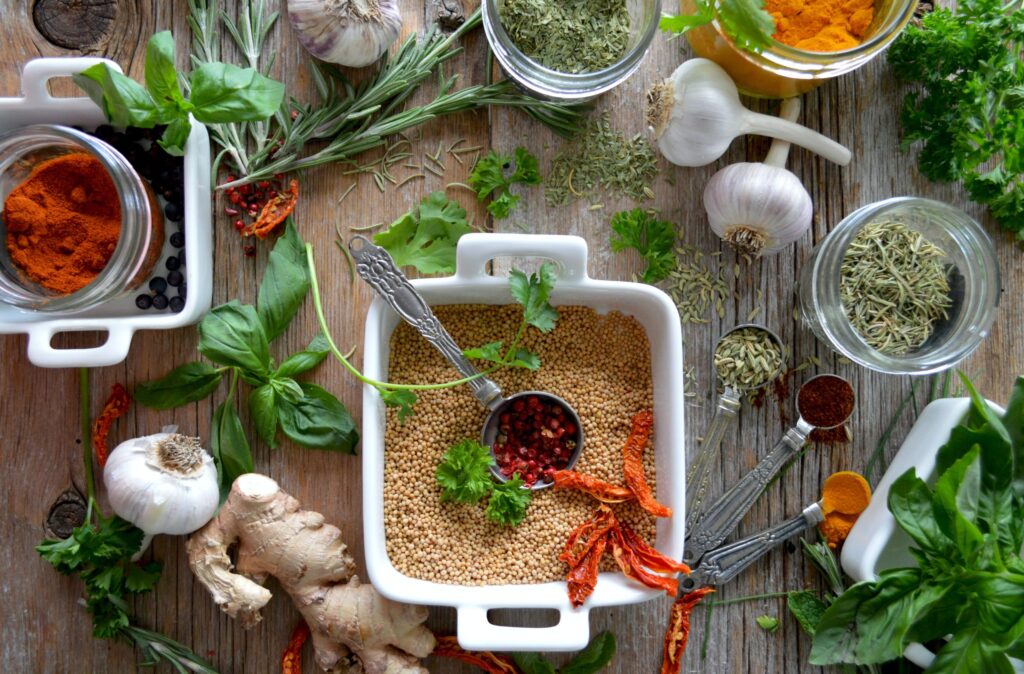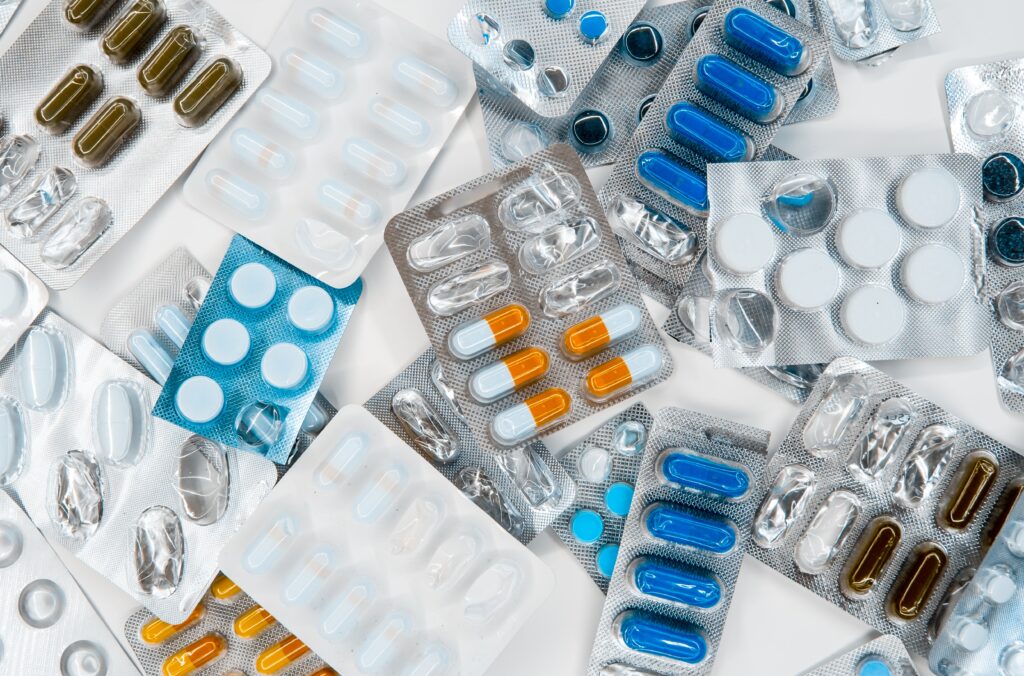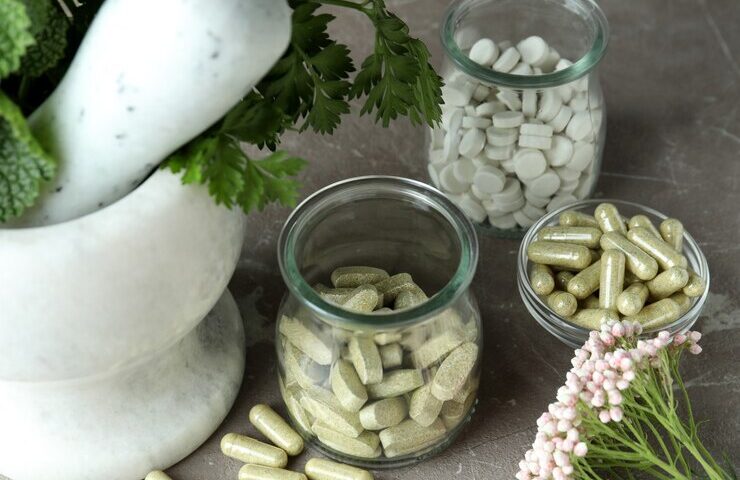Antibiotics are a type of medicine that fight against bacteria. They destroy or make it difficult for bacteria to grow in the body. Antibiotics are used by humans as well as animals. Antibiotics are available in two types- Natural and Medicinal.
Natural antibiotics are the ones we get directly from natural sources. These are mainly in the form of foods. Garlic, fenugreek, cardamom, turmeric root, honey, and many other naturally occurring foods have antibacterial properties. These prevent and help fight viruses caused by bacteria.
Medicinal antibiotics come in the form of tablets, capsules, liquids, creams, and ointments. These are lab-produced medications that undergo a series of chemical reactions to produce the substances of the medicine.
Both pharmaceutical and natural antibiotics for humans have proved beneficial and work in almost the same way. However, you should make them work hand in hand rather than depending on just one. This means that inculcating foods with antibiotic properties ensures your body remains healthy and fights bacteria. However, even then you experience a virus caused by bacteria, you can choose a medicinal antibiotic.
What is a Natural Antibiotic?
A natural antibiotic is known to combat bacteria harming us and our bodies. These are mainly anti-bacterial foods that are naturally occurring and do not need to undergo a series of processes before being consumed. After knowing the plant that is perfect for your requirement, you can harness the plant part directly from the field. In most cases, it can be consumed raw. However, you can also cook it as per your requirement and preference.
Almost all naturally occurring antibiotics do not have any side effects, however, there are alternatives to antibiotics that are naturally available if one doesn’t suit your body. For example, nuts lower blood pressure. However, if you are allergic to them, you can replace them with oats and garlic.

There are also various recipes and food combinations that work incredibly in finding certain skin conditions. We may not completely rely on natural antibiotic foods for fighting bacteria, but they are a great alternative to antibiotics made synthetically. This is because the natural ones reduce the consumption of synthetic antibiotics to a great extent.
Get Rid of Bacterial Infections: Home Remedy Antibiotics
Ayurveda, an ancient Indian Medicine Technique, completely relies on natural antibiotics for fighting bacteria and treating diseases. The best quality about this technique is that it doesn’t have any side effects. There are a few foods with antibacterial properties that have promising effects and are readily available:
Ginger
With a high antibacterial effect, ginger contains gingerol and shogaols giving them medicinal properties. Its properties are also effective for cleansing the gut and improving digestion without disrupting the good bacteria.
Moreover, ginger is highly used for colds and coughs and fights the bacteria causing the virus by showing anti-inflammatory activity. You can consume it in the form of ginger tea or chew on a peeled slice of fresh ginger.
Turmeric
Curcumin is the active ingredient in turmeric, making it one of the most powerful natural antibiotics. Curcumin gives turmeric anti-inflammatory and anti-carcinogenic properties. The roots of turmeric are the most beneficial.
This culinary spice is beneficial upon internal consumption and topical application. It improves skin, provides relief during throat-related problems, and heals injuries (burns, cuts, swelling, etc.)
This ingredient is widely used in powdered form. You can add this to water, milk, and curries for oral consumption. In the case of an external application, you can either make a paste with water or apply it dry.
Garlic
A strong natural antibiotic, it also has anti-fungal and anti-microbial properties. Consuming garlic in your meals will be great for the prevention of illnesses and boosting the immune system.
Best for lowering blood pressure, garlic also gives you good skin, reduced risk of heart diseases, and relief against colds and coughs. The best way to consume garlic is by crushing a few cloves and adding them to your food.
Honey
One of the oldest antibiotics, natural honey is a marvelous natural antibiotic. Its high sugar content contributes to killing bacteria. It can be orally consumed or even applied on the skin.
Honey can be applied to wounds and mouth ulcers. This makes the bacteria dehydrate and dry off while aiding the healing process.
You can consume honey in your herbal tea or replace sugar in your coffee or tea. While you won’t even notice any difference, the beverage will now be much healthier than it is every day!
Onion
A close relative of the garlic family, onions have antibiotic properties. During cold weather and flu seasons, onions help fight against virus-causing bacteria.
Moreover, even though raw onions make your breath stink, they also ward off oral bacteria.
If you aren’t fond of raw onions, you can add them to your sandwich, ramen, or rice to decrease the taste of raw onions.
However, having them cooked is easier by adding to gravies, curries, soups and so many more dishes! You can have them fried, baked, grilled, or pureed, it will be nutritious in all forms!
Various other ingredients benefit the body against bacteria. With each having effective benefits of its own, natural antibacterial foods are prevention and cure for bacteria in the body.
What is a Medicinal Antibiotic?
After Alexander Fleming gave birth to Penicillin in 1928, the medical world noticed an increase in the development of antibiotics. These are created after undergoing chemical combinations for an antibiotic or bacteria-killing effect. This is mainly derived from a mix of chemicals in the right proportions to create the desired effect.
For example,
Azithromycin has antibiotic properties to treat infections of the skin, eye, respiratory tract, and ear.
Doxycycline is another antibiotic medicine that treats bacterial infections in the body. It improves symptoms and cures the infection as well.

How does Antibiotic Medicine work?
Antibiotic medicine is of two types:
Narrow Spectrum – These are designed to kill specific bacteria that they are developed for. For example, a medicine that reduces inflammation.
Broad spectrum – This antibiotic medicine kills a variety of bacteria. This includes the good bacteria in our body too, leading to side effects.
These antibiotics either work by killing the bacteria or stopping them from multiplying further. Moreover, pharmaceutical antibiotics work much faster than natural antibiotics.
The medicine attacks the wall surrounding the bacteria and interferes with the reproduction process. Eventually, killing the bacteria.
Incorporating Antibiotics into Daily Life
Antibiotics come in various forms and treat specific conditions. However, one of the best ways to avoid and treat infections is by maintaining a clean and hygienic lifestyle. This can be done by adding a few elements to your daily routine.
Hand Sanitizers
Our hands are prone to touching most things around us, making them a magnet for bacteria. Using these hands, we end up touching our noses, eyes, and mouth. This may be done subconsciously during daily functioning and is almost unavoidable. However, you can avoid transmitting the bacteria to other parts of your body by using a hand sanitizer. This will avoid germs to go to other parts of your body especially when you are out.
Toothpaste
Our mouth leads to the most important parts of our body. Whatever goes in our mouth travels to our stomach and is absorbed by the entire body. When the mouth gets in touch with an infection, it can enter your body. This includes salivary bacteria, gum disease, plaque, cavities, gingivitis, etc.
This is when an antibacterial toothpaste helps. It keeps your mouth clean by cleansing the bacteria every time you brush your teeth.
Soap
Bacterial infections are not just related to the inside of the body, they are equally infectious on your skin. It is important to clean your body and face with an anti-bacterial soap almost every day to kill the bacteria. This maintains body hygiene making you less prone to bacterial infections.
Antibacterial Antiseptic
An injury can become an epicenter of bacterial infection if not treated properly. An antibacterial antiseptic can be applied to wounds or even added to your body. This also helps treat initial bacterial infection symptoms that may transform into a chronic infection.
Make sure the open wound is not exposed as it will only make it worse. Or sometimes it can even give inflation around the wound which can be cured by anti-inflammatory medicines whether medicinal or natural. Healing wound completely depends on what type of treatment you are getting.
Pros and Cons of Antibiotics
Natural antibiotics do not have any side effects unless you are allergic to them, wrongly consume them, or indulge in overconsumption. When rightly used and consumed in the right amount, natural antibiotics improve your overall health and keep several diseases at bay.
However, medical antibiotics, are designed in such a way that they kill the bacteria and slow its growth. They also provide resistance against infections that may occur due to surgery or injury. Moreover, medical antibiotics are quick to react and show effect within a few hours.
Despite their many benefits, antibiotics might not have immediate side effects, but they can show a few limitations upon over-usage in the long run. After prolonged or frequent use, the body starts to show resistance against the antibiotics. This reduces the effectiveness of the medicine.
Moreover, certain antibiotics come with a few side effects such as increased sensitivity to sunlight, liver damage, etc, and can also weaken your immune system. This usually happens if you are heavily dependent on antibiotics.
It is best to consult your doctor and know in detail about the medicines you are consuming. You should also read the fine print to know about the medications consumed by you.



